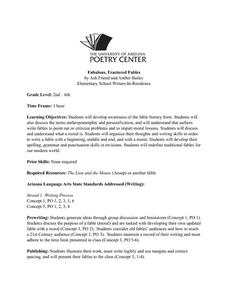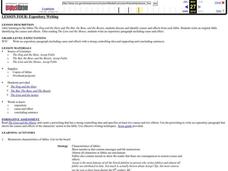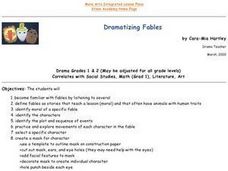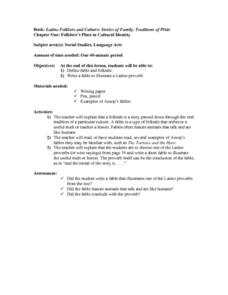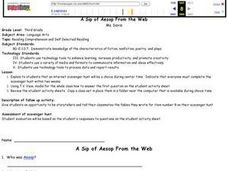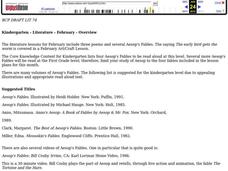Curated OER
Comprehension Skills: Evaluate Using Fiction Stories and Aesop's Fables
Primary readers investigate several comprehension skills in the ten lessons of this unit. Forming opinions about stories, comparing stories to each other, using Venn Diagrams, and applying the ideas from a story to real life situations...
Curated OER
Aesop's Fables (Grade 3)
Third graders develop a presentation based on Aesop's Fables. In this Aesop Fables and presentation lesson, 3rd graders examine the characteristics of fables and how to interpret them. They choose one of Aesop's Fables to research. They...
Curated OER
All About Aesop
First graders explore the genre of fables. In this fables lesson, 1st graders use various reading strategies to raise comprehension skills. Students make prediction and complete a prediction journal. Students understand that fables have...
Curated OER
Theme and Fables Review
In this fables worksheet, students read fables and write the moral of the story and how their answer relates to the story. Students do this for 5 stories.
Curated OER
Fabulous, Fractured Fables
Elementary schoolers develop an awareness of the literary form known as the fable. They explore how authors write fables to pass along moral lessons. After reading and discussing many famous fables embedded in the plan, learners attempt...
Curated OER
Fables Unit Lesson Plan
Students study fables in a broad context. In this literary lesson on fables, students define terms unique to them. Students use a variety of technological resources to gather and classify information into three categories. Students also...
Curated OER
Fables and Trickster Tales Around the World
Students analyze fables and trickster tales from various cultural traditions. In this fable analysis lesson, students identify the elements of fables and trickster stories. Students read Aesop's fables and Ananse spider stories. Students...
Curated OER
Acting Like a Bunch of Animals: Fables and Human
The video "The Tales of Aesop" traces for viewers the history of fables and identifies their characteristics. The class then goes to the web site "The Fisherman and the Little Fish" where they examine the classic and a modern version of...
Curated OER
Snail Mail vs. E-mail: Let the Challenge Begin
Compare past and present forms of written communication with a fable to guide your pupils in discovering the benefits of various forms of written communication.
Curated OER
Greek culture and Aesop's Fables
Tenth graders explain political and social thought during the Greek 6th and 5th centuries B.C. They research five to eight fables, figuring out the moral for each and writing an essay on how Aesop influenced the morals and ideals of...
Curated OER
And the Moral Is...
Students complete a unit using Aesop's fables to learn about morals and insert them into their everyday lives. In this moral values lesson, students complete four lessons using various Aesop's fables.
Curated OER
Understanding and Writing Fables
Third graders review with the teacher the characteristics for a fable and what it is. They read one paragraph each from the story, "The Fox and the Stork" aloud. They then answer comprehension questions aloud. Next, they listen to four...
Curated OER
Writing a Fable
Students are introduced to the definition of a fable in that it is a story that has a moral for people to apply in their lives. They then read a fable together so they have a better understanding. Next, students write their own fables.
Curated OER
Kindness Fables
Young scholars create a fable that is based on kindness. In this fables lesson plan, students read and discuss different fables. Then they discuss kindness, and write their own fables based on the kindness of others.
Curated OER
Expository Writing
Write an expository paragraph First, writers first read three fables and identify a cause and effect relationship in the fables. Then, they write their own expository paragraph with a cause and effect relationship. A list of...
Nosapo
Reading Activity: Circle the Right
Fables can teach us about life's morals, but they are also helpful for reviewing verb tense, spelling, and word choice. Three reading passages feature well-known fables, each with several opportunities for students to circle the correct...
Curated OER
Greek Culture And Aesop's Fables
Students investigate Aesop's Fables and how they influenced the culture of Ancient Greece. They research five different fables and reflect upon the morals of the stories and state how they influenced the practices of the Greek in writing.
Curated OER
Dramatizing Fables
Young scholars familiarize themselves with fables by listening to several of them. They define fables. They identify the moral of a specific fable. They identify characters, plot and sequence of events. They create a mask of a character...
K5 Learning
Androclus and the Lion
Kindness is never a standalone act. Fourth graders read the classic tale of Androclus and his act of service to the lion, which is repaid to him by the lion in a Roman colosseum. After reading the passage, they answer four comprehension...
Curated OER
Understanding Theme With Fables
In this theme worksheet, students read a set of short fables, determine theme and write their explanations below each.
Curated OER
Latino Folklore and Culture: Stories of Family, Traditions of Pride
Students define the terms fable and folktale. They write a fable to illustrate a Latino proverb. Students are explained that a folktale is a story passed down through the oral tradition of a particular culture. A fable is a type of...
Curated OER
A Sip of Aesop From the Web
Third graders answer specific questions by conducting an Internet scavenger hunt. They write their own fable after reading many different fables on the Internet. They questions that they answer are included in this lesson.
Curated OER
Aesop's Fables
Students read a fable about a lion and a mouse. They discuss the differences between the two animals. As a class, they discover the lesson of the story. Then they make puppets and reenact the fable.
Curated OER
Aesop’s Fables Comparison Worksheet
In this Aesop's Fables comparison instructional activity, students list the name of the fable, its characters, a story summary, and the moral of the story. They compare 6 fables.






